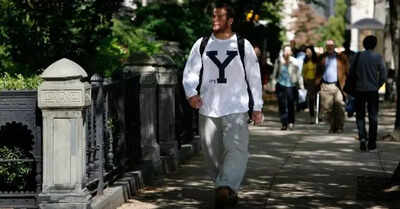
Yale University announces hiring freeze, spending cuts
Yale University has announced a series of immediate cost-cutting measures, including a 90-day hiring freeze, a 5% reduction in non-salary expenditures, delays to upcoming construction projects, and a scaled-back pool for annual salary increases.
The decision follows growing financial uncertainty as the U.S. Congress considers changes to federal tax policy that could significantly impact Yale’s endowment income—one of its largest funding sources.These institutional adjustments were formally communicated to faculty and staff on Monday by top university administrators. The announcement has drawn attention across the academic world, particularly among institutions with large endowments and a high dependence on investment returns to fund teaching, research, and student support.
What the proposed bill means for Yale
At the centre of Yale’s financial caution is a proposed amendment to the U.S. federal tax code currently under consideration in Congress. The legislation would overhaul the endowment tax introduced in 2017 by the Trump administration, which currently levies a flat 1.4% tax on investment returns at wealthy private universities.The new proposal suggests a tiered system, where the tax rate would increase based on a university’s endowment value in relation to its student population—a measure called “student-adjusted endowment.”
Institutions like Yale, which have a very high endowment per student, would fall into the top tier and face an 8% tax on net investment income. This is a substantial increase from the current rate and would make Yale one of only a handful of universities—including Harvard, Princeton, MIT, and Stanford—subject to the highest level of taxation.University officials have stated that this change could create a significant shortfall in the funds that support essential services such as research programs, academic departments, and student financial aid.
What is affected and what is not
The hiring freeze will remain in effect for 90 days and applies to new, replacement, and temporary staff positions across Yale’s academic and administrative departments. However, several critical areas have been exempted from the pause. Roles that are funded through external research grants or are part of clinical operations, especially within the School of Medicine and science departments, will not be affected.
Additionally, student employment positions are generally excluded from the freeze, ensuring that on-campus work opportunities for undergraduates and graduates remain intact.Searches for faculty positions will continue but require prior approval from the university provost and the relevant school dean. Ongoing recruitment processes for existing vacancies can proceed under this modified framework.In addition to the hiring restrictions, Yale will implement a 5% cut in non-salary expenses.
These include discretionary spending in areas such as departmental travel, administrative operations, and procurement. Importantly, the university has clarified that financial aid programs for students will not be impacted by this reduction.
Construction delays and broader context
Yale has also decided to delay several construction projects that were in the early stages of planning. Although no specific projects have been identified publicly, university officials had earlier indicated plans to pause at least 10 development initiatives in New Haven.
These delays are expected to ease financial pressure and allow the university to reassess priorities based on how the legislative process evolves.Yale’s announcement aligns with similar actions taken by other leading U.S. universities that are anticipating a downturn in federal support. In recent months, Harvard and the University of Pennsylvania imposed their own hiring freezes, while Columbia University reportedly laid off around 180 staff members funded by discontinued federal grants.While Yale’s access to federal research funding has not yet been directly restricted, the university remains cautious. In the 2024 fiscal year alone, Yale received approximately $900 million in federal grants and contracts. With potential changes to how such funds are allocated, the administration is preparing for multiple financial scenarios.
Monitoring the legislative outcome
The university has signaled that these measures are precautionary and subject to revision as the financial and political landscape becomes clearer.
In the coming weeks, U.S. lawmakers are expected to continue debating the federal budget reconciliation bill, with further amendments likely. Yale’s leadership has committed to reviewing its policies and financial decisions regularly and making necessary adjustments in response to the final legislative outcomes.
For students and researchers, the current steps may have limited immediate impact, especially with financial aid and grant-based hiring protected. However, the broader implications of the proposed tax reforms—if enacted—could reshape how elite institutions like Yale manage their finances in the long term.

 1 month ago
1 month ago


















